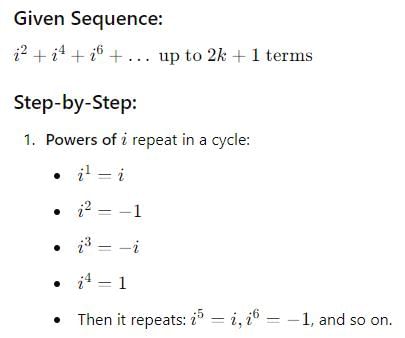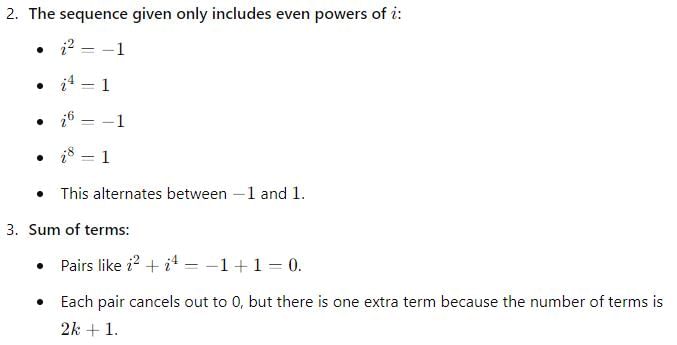JEE Exam > JEE Questions > i2+i4+i6+...........up to 2k + 1 terms, for a...
Start Learning for Free
i2+i4+i6+........... up to 2k + 1 terms, for all k belongs to natural numbers N.
- a)1
- b)-1
- c)0
- d)none of these
Correct answer is option 'B'. Can you explain this answer?
Verified Answer
i2+i4+i6+...........up to 2k + 1 terms, for all k belongs to natural n...



Most Upvoted Answer
i2+i4+i6+...........up to 2k + 1 terms, for all k belongs to natural n...
To solve this problem, we need to find the sum of the series i2 i4 i6 ...........up to 2k 1 terms, for all k belongs to natural numbers N.
Let's break down the given series and analyze it step by step.
Step 1: Simplifying the series
The given series can be written as:
i^2 + i^4 + i^6 + ... + (2k)^2
Step 2: Identifying the pattern
We can see that each term in the series is of the form i^(2n), where n is a positive integer.
Step 3: Finding the sum of the series
The sum of a series in the form of a geometric progression can be found using the formula:
S = a * (r^n - 1) / (r - 1)
In this case, the first term (a) is i^2, the common ratio (r) is i^2, and the number of terms (n) is k.
So, the sum of the series can be written as:
S = i^2 * (i^2)^k - 1 / (i^2 - 1)
Step 4: Simplifying the expression
Using the laws of exponents, we can simplify the expression further:
S = i^2 * i^2k - 2 / (i^2 - 1)
S = i^(2 + 2k - 2) / (i^2 - 1)
S = i^(2k) / (i^2 - 1)
Step 5: Evaluating the sum for all k belongs to natural numbers N
Since i is the imaginary unit, i^2 = -1. Substituting this value into the expression, we get:
S = (-1)^k / (-1 - 1)
S = (-1)^k / (-2)
S = (-1)^(k-1) / 2
Step 6: Determining the answer
The sum of the series (-1)^(k-1) / 2 is (-1)^(k-1) divided by 2.
Since the sum of the series is -1/2 for all k belongs to natural numbers N, the correct answer is option 'B' (-1).
Let's break down the given series and analyze it step by step.
Step 1: Simplifying the series
The given series can be written as:
i^2 + i^4 + i^6 + ... + (2k)^2
Step 2: Identifying the pattern
We can see that each term in the series is of the form i^(2n), where n is a positive integer.
Step 3: Finding the sum of the series
The sum of a series in the form of a geometric progression can be found using the formula:
S = a * (r^n - 1) / (r - 1)
In this case, the first term (a) is i^2, the common ratio (r) is i^2, and the number of terms (n) is k.
So, the sum of the series can be written as:
S = i^2 * (i^2)^k - 1 / (i^2 - 1)
Step 4: Simplifying the expression
Using the laws of exponents, we can simplify the expression further:
S = i^2 * i^2k - 2 / (i^2 - 1)
S = i^(2 + 2k - 2) / (i^2 - 1)
S = i^(2k) / (i^2 - 1)
Step 5: Evaluating the sum for all k belongs to natural numbers N
Since i is the imaginary unit, i^2 = -1. Substituting this value into the expression, we get:
S = (-1)^k / (-1 - 1)
S = (-1)^k / (-2)
S = (-1)^(k-1) / 2
Step 6: Determining the answer
The sum of the series (-1)^(k-1) / 2 is (-1)^(k-1) divided by 2.
Since the sum of the series is -1/2 for all k belongs to natural numbers N, the correct answer is option 'B' (-1).

|
Explore Courses for JEE exam
|

|
Question Description
i2+i4+i6+...........up to 2k + 1 terms, for all k belongs to natural numbers N.a)1b)-1c)0d)none of theseCorrect answer is option 'B'. Can you explain this answer? for JEE 2025 is part of JEE preparation. The Question and answers have been prepared according to the JEE exam syllabus. Information about i2+i4+i6+...........up to 2k + 1 terms, for all k belongs to natural numbers N.a)1b)-1c)0d)none of theseCorrect answer is option 'B'. Can you explain this answer? covers all topics & solutions for JEE 2025 Exam. Find important definitions, questions, meanings, examples, exercises and tests below for i2+i4+i6+...........up to 2k + 1 terms, for all k belongs to natural numbers N.a)1b)-1c)0d)none of theseCorrect answer is option 'B'. Can you explain this answer?.
i2+i4+i6+...........up to 2k + 1 terms, for all k belongs to natural numbers N.a)1b)-1c)0d)none of theseCorrect answer is option 'B'. Can you explain this answer? for JEE 2025 is part of JEE preparation. The Question and answers have been prepared according to the JEE exam syllabus. Information about i2+i4+i6+...........up to 2k + 1 terms, for all k belongs to natural numbers N.a)1b)-1c)0d)none of theseCorrect answer is option 'B'. Can you explain this answer? covers all topics & solutions for JEE 2025 Exam. Find important definitions, questions, meanings, examples, exercises and tests below for i2+i4+i6+...........up to 2k + 1 terms, for all k belongs to natural numbers N.a)1b)-1c)0d)none of theseCorrect answer is option 'B'. Can you explain this answer?.
Solutions for i2+i4+i6+...........up to 2k + 1 terms, for all k belongs to natural numbers N.a)1b)-1c)0d)none of theseCorrect answer is option 'B'. Can you explain this answer? in English & in Hindi are available as part of our courses for JEE.
Download more important topics, notes, lectures and mock test series for JEE Exam by signing up for free.
Here you can find the meaning of i2+i4+i6+...........up to 2k + 1 terms, for all k belongs to natural numbers N.a)1b)-1c)0d)none of theseCorrect answer is option 'B'. Can you explain this answer? defined & explained in the simplest way possible. Besides giving the explanation of
i2+i4+i6+...........up to 2k + 1 terms, for all k belongs to natural numbers N.a)1b)-1c)0d)none of theseCorrect answer is option 'B'. Can you explain this answer?, a detailed solution for i2+i4+i6+...........up to 2k + 1 terms, for all k belongs to natural numbers N.a)1b)-1c)0d)none of theseCorrect answer is option 'B'. Can you explain this answer? has been provided alongside types of i2+i4+i6+...........up to 2k + 1 terms, for all k belongs to natural numbers N.a)1b)-1c)0d)none of theseCorrect answer is option 'B'. Can you explain this answer? theory, EduRev gives you an
ample number of questions to practice i2+i4+i6+...........up to 2k + 1 terms, for all k belongs to natural numbers N.a)1b)-1c)0d)none of theseCorrect answer is option 'B'. Can you explain this answer? tests, examples and also practice JEE tests.

|
Explore Courses for JEE exam
|

|
Signup for Free!
Signup to see your scores go up within 7 days! Learn & Practice with 1000+ FREE Notes, Videos & Tests.


















